
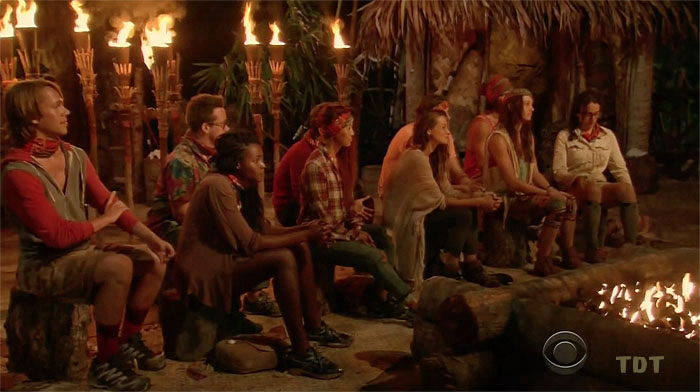
Ah, I’m late this week. I’m so sorry. But stop crying. The column’s here now.
You see, I took a weekend trip to Telluride and didn’t get to chance to sit down and write this before Monday. That’s bad because I think I had so many good ideas for this column and they’re now lost to the netherworld.
Dumb, Pat.
You know what else was dumb? Picking Mari to win the game. I’m clearly not a bright person when it comes to picking winners. Maybe next year I’ll actually watch the videos before choosing a winner? But, you know what? It wouldn’t have mattered this season. Mari seemed like the perfect person to play Survivor. That should have told me not to pick her. But, again: I’m dumb.
But you know who wasn’t dumb this week? That would be Michelle. While that braid might not be the smartest thing, all of a sudden the bible translator looked like a seasoned Survivor pro. How good was she? She made Jay seem smart for a second. Nuff said.
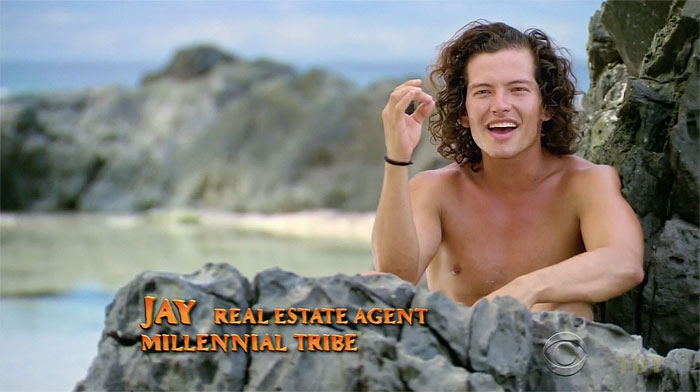
Now it’s time to, as Jeff Probst would say, dig deep into some theory explaining this week’s episode.
And what an episode it turned out to be. This thing crammed just about everything you want from Survivor into one 60-minute sprint: showmances, medical emergencies, blindsides, idols and a lack of focus on Gen X’s bad tattoos. Everyone was a winner … except me and, oh yeah, Mari. And Hannah. Definitely not Hannah.
But how did the vote go from clearly Figgy to Mari in seemingly a matter of minutes? Well, let’s talk some organizational theory.
Tribes on Survivor often act like any organization would. And this makes complete sense. On a tribe, just like in an organization, there are leaders, large and small subgroups, chains of command, hierarchies, common language, etc. But it often takes a while for these characteristics to emerge and for good players to understand how to adapt their game to their place in the organization. At episode two, we’re still early for that adaptation process.
In his seminal book, Images of Organization, business professor Gareth Morgan provides a really strong summary of various types of organizations. I talked about this book back during the Second Chance season, but I discussed a different metaphor then. See, the genius of Morgan’s book is that he likens numerous types of organizations to common metaphors. So some organizations work as machines, some as brains, some as political systems, some as cultures, some as psychic prisons…. The list goes on and on.
What I think we saw this week was an organization as an organism. The basic idea behind this metaphor is that organizations continually evolve and grow or they die. And the key to Morgan’s theory about this type of organization is that it goes against a lot of prior research, work that showed most organizations work as machines and truly struggle to adapt.
So how did this play out this week? Well, the organization had a clear goal: Break up the showmance. Taylor and Figgy couldn’t even be smart enough to make out when nobody could hear them and now, as Michaela noted, they had a chance to take over the game. The organization began working as a machine: Get out Figgy.
As far as we’ve seen, Michelle didn’t act as a leader at Millennials camp. She shouldn’t have owned enough agency, or power, to change the vote. But as Morgan notes in his book, there are various species of organisms, and an organization adapts to these species. These types of organizations are what he calls “open systems.”
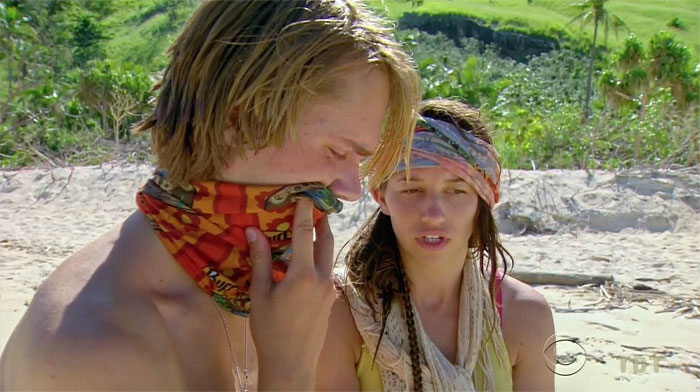
In a way, this is an apt description for Millennials: They’re self-interested and not tied down to any one thing. They’re fine maneuvering and changing things up to suit the situation. They often illustrate the organization as organism metaphor.
That happened here.
A different type of organism, Michelle subtly grabbed the reins of leadership for a split second, made people understand and accept her plan and then, kind of, cajoled the outliers into going along by making clear their mutual goals: to win. And that’s how good organizations as organisms work: Different people come together, all with differing individual goals, but with one clear organizational goal, which is, of course, success.
Michelle used her organization’s (or tribe’s) fluidity and ability to adapt to her advantage. Does anyone think something like this would work at camp Gen X? No way. They are much more like a machine, a tribe looking to eliminate any defective cog in said machine, any tribemate that doesn’t fall in line to Paul’s (seriously, Paul!) idea of a good tribemate.
That, my friends, is how differing types of organizations survive and, sometimes, thrive, working differently.
And with that, let’s get to my thoughts on each player. Needless to say, this week illustrated that predictions are not my forte, so don’t bet large sums of money on these predictions. Just send me the money instead. Oh, and let’s hope next week I’m more punctual with this here column.
Gen X — Takali
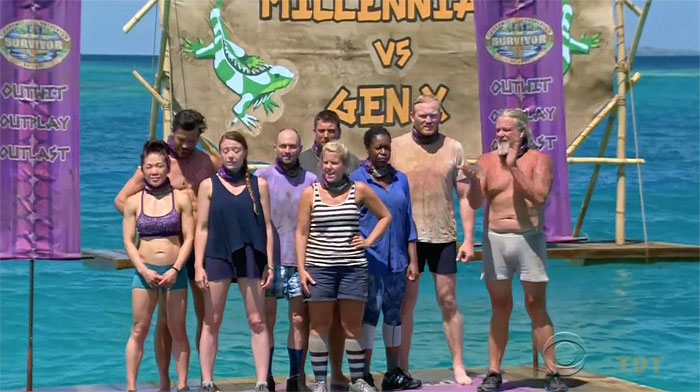
- 1. Chris — Chris kind of got lost in the shuffle this week. We know he’s an integral member of the main alliance over at Gen X, but editing keeps making us think the main alliance isn’t long for this world. I’m still seeing the same thing for Chris: A very early post-merge exit.
- 2. CeCe — CeCe finally made some moves this week. And thank god: With Mari out, my winner picks need to start looking good. I still don’t have high hopes for CeCe, but at least now the minority alliance seems to be coming together. And if CeCe gets to a merge, well, let’s just say a target won’t be on her.
- 3. Ken — Ken and the octopus. I could have watched an entire NatGeo documentary on that war. And besides being a kick-ass fisherman, Ken also made some amazing game moves. The way he connected with David seemed masterful. I’m thinking Ken could have a long run in this game.
- 4. Bret — Like Chris, we know Bret is in the main alliance and we also didn’t see him too much this week. Here’s my bold prediction of the week: Bret is the person targeted when David uses his immunity idol. I’m not sure this even makes sense, but I’m thinking it happens. Why not make this seemingly awful prediction? All of my others have been horrid.
- 5. Jessica — The way Jessica faded into the background this week makes me think she won’t play a large role in the game. And I’m thankful for this. Infected eyes aren’t fun to look at.
- 6. David — So David found the ol’ idol. And David continued receiving huge amounts of screen time. And David talked a lot. And David made a new alliance. And David now seems like he’s going pretty far in this game. Good for David. Just don’t block your ears when someone’s chopping wood, OK?
- 7. Lucy — Who’s Lucy?
- 8. Paul — Was everyone else as surprised as I was when all of a sudden we found out that Paul was a cult-like leader of Gen X? I literally rewound the show just to make sure I heard it correctly. So weird.
- 9. Sunday — Like most on this tribe, we saw very little of Sunday this week, except when she confirmed that David Lee Roth, I mean Paul, led her alliance. I thought Sunday looked like she could go relatively far. Maybe the edit says I’m wrong?
Millennials - Vanua
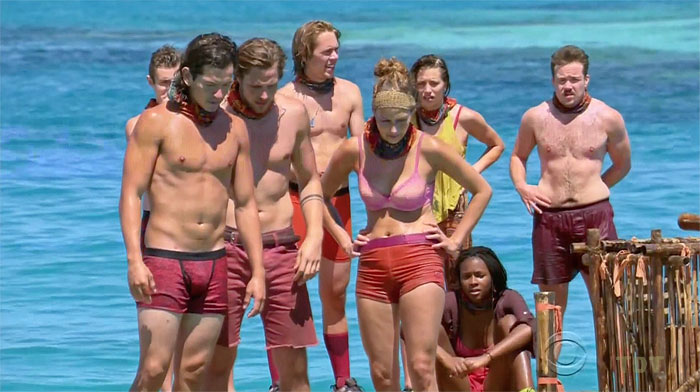
- 1. Adam — nce again, Adam remained invisible. Once again, that didn’t feel good for his long-term prospects. And he also was one of the few on his tribe that voted for Figgy. This is not a good look for Adam.
- 2. Hannah — Oh, Hannah. Such a spastic woman. I mean, most probably think the worst thing she did this week revolved around switching her vote. That’s bad because she’s now going to not be trusted by her original allies. But her biggest dumb mistake was her dramatic voting. You simply can’t take that long, hemming and hawing about who to vote for, without calling massive amounts of attention upon yourself. Now nobody trusts her.
- 3. Michelle — As we’ve already talked about, just a great week for Michelle. I’m not sure about the long-term strategy at play here, but she absolutely did what needed to be done to stay in control. Good for her. Now cut the braid off, OK?
- 4. Taylor — You know, give Taylor a break. He doesn’t really want to be on Survivor. This bro would rather be making out and snowboarding. At the same time. If that’s a future immunity challenge, my money is on Taylor.
- 5. Zeke — The editing makes me think Zeke is in this game for the long haul, but, of course, he’s like Adam: one of the few people on the outside of the vote. I think that’s OK, though. And I also think Zeke gets his revenge at some point. But, as of now, I think he’s going to piss too many people off to actually win this thing.
- 6. Jay — Sweet, sweet Jay. He just wants to bro-out while bowling. Can you blame the dude? That’s all. Damn Taylor and Figgy for ruining this for Jay. On the plus side, and not joking here, his speech to Michaela did turn this vote around. So, yeah, good for Jay. And I hope he gets to bowl with his bros soon.
- 7. Michaela — I think Michaela encountered the toughest decision this week. Her choice to target Mari instead of Figgy truly might have been the defining vote of the season. If Figgy goes and the triforce is weakened, I have a feeling life at the Millennials camp ends up a whole lot different. Since I’m really enjoying Michaela, I just hope voting for Mari works out well for her.
- 8. Figgy — I’m giving Figgy absolutely no credit this week. She’s not playing the game well at all. But Michelle bailed her out this week. We’ll see how long that lasts.
- 9. Will — Reagan and Jesus. Yep. I still can’t actually get past that. But now I’ve added something new about Will that I can’t get past: his voice. It’s the deepest voice I’ve ever heard from an 18-year-old guy. More importantly, I had some high hopes for Will after the first episode, but the way he was manipulated by fellow Jesus fan Michelle gives me a bad feeling for good ol’ deep voice.
As the smartest man alive likes to say, sort of, with that, we’re on to episode 3. Here’s to hoping the good stuff keeps coming.
 Pat Ferrucci started watching Survivor when Episode Two of Borneo first aired. He's seen every episode since. Besides recapping here, he'll be live-tweeting this season from the Mountain Time Zone. Why? Because nobody cares about the Mountain Time Zone except when they want to ski. Follow him @patferrucci for Survivor stuff and tweets about anything and everything that enters his feeble mind.
Pat Ferrucci started watching Survivor when Episode Two of Borneo first aired. He's seen every episode since. Besides recapping here, he'll be live-tweeting this season from the Mountain Time Zone. Why? Because nobody cares about the Mountain Time Zone except when they want to ski. Follow him @patferrucci for Survivor stuff and tweets about anything and everything that enters his feeble mind.
- Index of articles
- Cast preview: And the winner? I don't know?
- Ep.1: All about the power of the prime
- Ep.2: Michelle guides the organism
- Ep.3: Paul's poorly framed response sinks him
- Ep.4: Dissonance dismisses silence
- Ep.5: David continues forcing others to innovate
- Ep.6: Figgy sees selectively, gets the boot
- Ep.7: Michaela gets dysfunctional and gets dys-boot
- Ep.8: How the castaways stack up post-merge
- Eps.10-11: Jessica's dismissal just part of the agenda
- Ep.12: Will seeks his trophy, Zeke hits the road
- Ep.13: Who holds the most finale power?
- Pre-Ep.14: Jury jeopardy